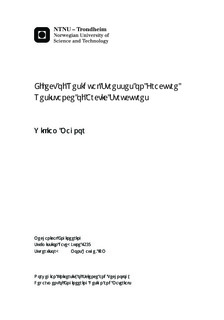Effect of Residual Stresses on Fracture Resistance of Arctic Structures
Abstract
In integrity assessments, residual stresses have a significant effect on the crack driving force. In fracture assessments according to BS 7910 residual stresses are treated conservatively, and is often assumed to be equal to the material yield strength. In this work, a finite element model of a cracked steel plate was used to study the contribution to crack driving force from residual stresses. Residual stresses were introduced by the eigenstrain method and nodes were released to create cracks. Crack depths, a, up to 20 mm, crack lengths, 2c, up to 50 mm and through thickness cracks were investigated. Solutions were compared to reference solutions with the same crack dimensions, but no residual stress. Corresponding fracture assessments according to BS 7910 were performed to illustrate the difference in crack driving force between FEM and BS 7910. The dimensionless parameter R, was developed during this work and denotes the effect of residual stresses. R can be computed both for results from FEM and BS 7910. It can be seen that R depend on crack parameters and decrease as load increase. Generally, R is significantly higher for solutions according to BS 7910.
